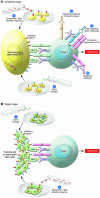Costimulation couture: a designer approach to regulating autoimmunity
- PMID: 16886054
- PMCID: PMC1523390
- DOI: 10.1172/JCI29455
Costimulation couture: a designer approach to regulating autoimmunity
Abstract
Negative or inhibitory costimulatory pathways regulate T cell activation and play a role in peripheral tolerance. Targeting these pathways harnesses the physiologic mechanisms of regulating autoimmunity and could prove beneficial for the therapy of autoimmune diseases. However, attempts at targeting these pathways have been fraught with difficulties. In this issue of the JCI, Fife et al. describe a creative approach for targeting CTL-associated antigen 4 (CTLA-4) on activated T cells via genetically engineered B cells to prevent autoimmune diabetes in the NOD mouse (see the related article beginning on page 2252). Novel "designer" strategies targeting negative costimulatory pathways provide reasons for optimism in the search for a cure for devastating autoimmune diseases.
Figures

Comment on
-
Inhibition of T cell activation and autoimmune diabetes using a B cell surface-linked CTLA-4 agonist.J Clin Invest. 2006 Aug;116(8):2252-61. doi: 10.1172/JCI27856. J Clin Invest. 2006. PMID: 16886063 Free PMC article.
Similar articles
-
Complexities of CD28/B7: CTLA-4 costimulatory pathways in autoimmunity and transplantation.Annu Rev Immunol. 2001;19:225-52. doi: 10.1146/annurev.immunol.19.1.225. Annu Rev Immunol. 2001. PMID: 11244036 Review.
-
Inhibition of T cell activation and autoimmune diabetes using a B cell surface-linked CTLA-4 agonist.J Clin Invest. 2006 Aug;116(8):2252-61. doi: 10.1172/JCI27856. J Clin Invest. 2006. PMID: 16886063 Free PMC article.
-
[Manipulation of costimulatory pathways in autoimmune disease].Nihon Rinsho. 1997 Jun;55(6):1531-6. Nihon Rinsho. 1997. PMID: 9200944 Review. Japanese.
-
Cytotoxic T lymphocyte antigen 4 (CD152) regulates self-reactive T cells in BALB/c but not in the autoimmune NOD mouse.J Autoimmun. 2000 Mar;14(2):123-31. doi: 10.1006/jaut.1999.0353. J Autoimmun. 2000. PMID: 10677243
-
B cell immunobiology in disease: evolving concepts from the clinic.Annu Rev Immunol. 2006;24:467-96. doi: 10.1146/annurev.immunol.24.021605.090517. Annu Rev Immunol. 2006. PMID: 16551256 Review.
Cited by
-
PDL1 is required for peripheral transplantation tolerance and protection from chronic allograft rejection.J Immunol. 2007 Oct 15;179(8):5204-10. doi: 10.4049/jimmunol.179.8.5204. J Immunol. 2007. PMID: 17911605 Free PMC article.
-
Selective CD28 blockade attenuates acute and chronic rejection of murine cardiac allografts in a CTLA-4-dependent manner.Am J Transplant. 2011 Aug;11(8):1599-609. doi: 10.1111/j.1600-6143.2011.03624.x. Epub 2011 Jul 12. Am J Transplant. 2011. PMID: 21749640 Free PMC article.
-
Resveratrol and curcumin suppress immune response through CD28/CTLA-4 and CD80 co-stimulatory pathway.Clin Exp Immunol. 2007 Jan;147(1):155-63. doi: 10.1111/j.1365-2249.2006.03257.x. Clin Exp Immunol. 2007. PMID: 17177975 Free PMC article.
References
-
- Bretscher P., Cohn M. A theory of self-nonself discrimination. Science. 1970;169:1042–1049. - PubMed
-
- Lafferty K.J., Woolnough J. The origin and mechanism of the allograft reaction. Immunol. Rev. 1977;35:231–262. - PubMed
-
- Lafferty K.J., Prowse S.J., Simeonovic C.J., Warren H.S. Immunobiology of tissue transplantation: a return to the passenger leukocyte concept. Annu. Rev. Immunol. 1983;1:143–173. - PubMed
-
- June C.H., Ledbetter J.A., Linsley P.S., Thompson C.B. Role of the CD28 receptor in T-cell activation. Immunol. Today. 1990;11:211–216. - PubMed
-
- Harding F.A., McArthur J.G., Gross J.A., Raulet D.H., Allison J.P. CD28-mediated signalling co-stimulates murine T cells and prevents induction of anergy in T-cell clones. Nature. 1992;356:607–609. - PubMed

